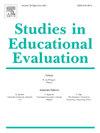调查形成性和终结性同行评估中的匿名性:对大学生社会情感因素、认知和偏好的影响
IF 2.6
2区 教育学
Q1 EDUCATION & EDUCATIONAL RESEARCH
引用次数: 0
摘要
本研究探讨了匿名对学生社会情感过程的影响,以及他们对形成性和终结性同伴评价和评分的看法和偏好。177 名高校学生参与了这项准实验研究。他们在接受了提供有效反馈的培训后,参加了两次同伴互评活动。第一项同伴互评活动是形成性的,第二项是总结性的。研究分为两种情况:匿名同伴互评和非匿名同伴互评。结果表明,尽管 73.6% 的学生(匿名条件下为 90.5%,非匿名条件下为 56.5%)更喜欢匿名同伴互评,但这种偏好并没有对公平性或同伴压力的感知产生重大影响。这对有关匿名影响的假设提出了挑战。有趣的是,非匿名环境仍然受到好评,开放式回答显示了面对面对话的价值。这表明,需要更多互动的非匿名、高度形成性同伴评价可能会带来更好的社会和人际关系结果。本文章由计算机程序翻译,如有差异,请以英文原文为准。
Investigating anonymity in formative and summative peer assessment: Effects on university students’ social-affective factors, perceptions and preference
This study examines the impact of anonymity on students’ social-affective processes, as well as their perceptions and preferences regarding peer assessment and grading for both formative and summative purposes. 177 higher education students participated in this quasi-experimental study. They participated in two peer assessment activities after receiving training on the provision of effective feedback. The first peer assessment activity was formative in nature, while the second was summative. The study had two conditions: anonymous peer assessment and non-anonymous peer assessment. Results indicate that although 73.6 % of all students (90.5 % in the anonymous condition and 56.5 % in the non-anonymous condition) preferred anonymous peer assessment, this preference did not significantly impact perceptions of fairness or peer pressure. This challenges assumptions around the effects of anonymity. Interestingly, non-anonymous settings were still favourably viewed, with the open-ended responses indicating the value of face-to-face dialogue. This suggests that non-anonymous, highly formative peer assessment requiring more interaction may lead to better social and interpersonal outcomes.
求助全文
通过发布文献求助,成功后即可免费获取论文全文。
去求助
来源期刊

Studies in Educational Evaluation
Multiple-
CiteScore
6.90
自引率
6.50%
发文量
90
审稿时长
62 days
期刊介绍:
Studies in Educational Evaluation publishes original reports of evaluation studies. Four types of articles are published by the journal: (a) Empirical evaluation studies representing evaluation practice in educational systems around the world; (b) Theoretical reflections and empirical studies related to issues involved in the evaluation of educational programs, educational institutions, educational personnel and student assessment; (c) Articles summarizing the state-of-the-art concerning specific topics in evaluation in general or in a particular country or group of countries; (d) Book reviews and brief abstracts of evaluation studies.
 求助内容:
求助内容: 应助结果提醒方式:
应助结果提醒方式:


